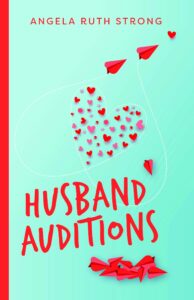by Angela Ruth Strong, @AngelaRStrong

When I’d just started writing, I had author ND Wilson tell me that the best promotion for a book is a bad movie. “A bad movie?” I asked. “Yeah,” he said. “No writer wants the movie to be better than their book.”
While this makes sense, I’m still one of those readers who yells at the screen when the movie veers away from its original story. But now that my book Finding Love in Big Sky is coming out on UPtv, and I’ve seen the filming process, I can appreciate why changes have to be made. Here are the seven reasons for altering a script:
- Time. I got the script for my movie before I went to the set, so I knew what to expect. They did change a lot, but mostly they took things out. The thing is, they had to. A novel is going to be around 300 pages, while an average screenplay is 100. The script does a good job of sticking to the main plot, and readers will discover much more depth when they pick up the book.
- Logistics. The horses in my book were Norwegian Fjord horses related to my character’s heritage. The horses in my movie were not. This would have been a lot harder for the studio to track down in their location and on their budget. They also turned The Coffee Cottage into The Western Café because they found a cute restaurant that agreed to let them film there. It was a good change and a fun place for eating breakfast with the director on my last day in Montana.
- Diversity. When they left the Norwegian heritage behind, they were able to cast a Persian actress to play Paisley, and they changed the race of a few other characters, as well, which was cool with me. I especially liked having an African American makeup artist who was pretty much Char (from Finding Love in Sun Valley) come to life.

- Logic. While I was on set, the director told me they added the line about Paisley having “glamping” tents built on her property because they filmed the ranch with a drone, and just in case one of the tents showed up on film, they didn’t want it to cause questions in the viewer’s mind. They also changed the city Josh was from because it fit the story better while I had to work within the parameters of a series where I’d already established that Josh was from Chicago.
- Visual. Film is a visual art form, so writers/directors find ways to show inner monologue. In my movie, they added a fortune cookie for the viewer to read, telling them this is what Josh is thinking. I didn’t remember writing this part, but I watched it with one of my line editors, and she thought I had written it, proving they did a good job blending it in.
- Marketability. Believe it or not, while I made my novel a Christmas story because I assumed that would help sell it to a movie producer, my producer took Christmas out. I was shocked when I heard. However, the market was saturated with Christmas stories, and she knew she’d have a better chance of selling it to a television channel if it could be played any time of the year.
- Audience. They also took the spiritual message out of my book, which is pretty common for Christian novels. They do this to reach a wider audience, and I’m okay with it because it expands the reach of my novel. Readers who might never normally pick up a Christian book could now be drawn to read one.
Overall, having my book made into a movie has been both an enjoyable and educational experience. The cinematography is exceptional, and someone from the Canadian channel that aired it already said Finding Love in Big Sky is the best movie they’ve had. American Cinema International did my story justice, and I’m excited to show it at a theater premiere here in Boise this September. But I’m still going to say the book is better.
In a world full of happily-ever-after love, Meri Newberg feels like the last young woman on the planet to be single, at least in her Christian friend group. So when she’s handed a strange present at the latest wedding–a 1950s magazine article of “ways to get a husband”–she decides there’s nothing to lose by trying out its advice. After all, she can’t get any more single, can she?
Her brother’s roommate sees the whole thing as a great opportunity. Not to fall in love–Kai Kamaka has no interest in the effort a serious relationship takes. No, this is a career jump start. He talks Meri into letting him film every silly husband-catching attempt for a new online show. If it goes viral, his career as a cameraman will be made.
When Meri Me debuts, it’s an instant hit. People love watching her lasso men on street corners, drop handkerchiefs for unsuspecting potential beaus, and otherwise embarrass herself in pursuit of true love. But the longer this game goes on, the less sure Kai is that he wants Meri to snag anyone but him. The only problem is that he may not be the kind of husband material she’s looking for . . .
Angela Ruth Strong sold her first Christian romance novel in 2009 then quit writing romance when her husband left her. Ten years later, God has shown her the true meaning of love, and there’s nothing else she’d rather write about. Her books have since earned TOP PICK in Romantic Times, been optioned for film, won the Cascade Award, and been Amazon best-sellers. She also writes non-fiction for SpiritLed Woman. To help aspiring authors, she started IDAhope Writers where she lives in Idaho, and she teaches as an expert online at WRITE THAT BOOK.


